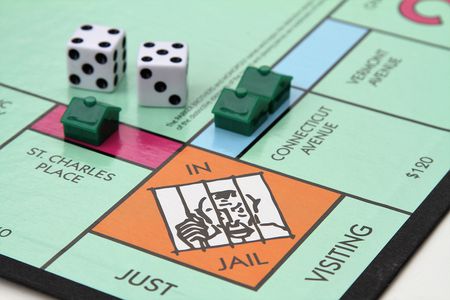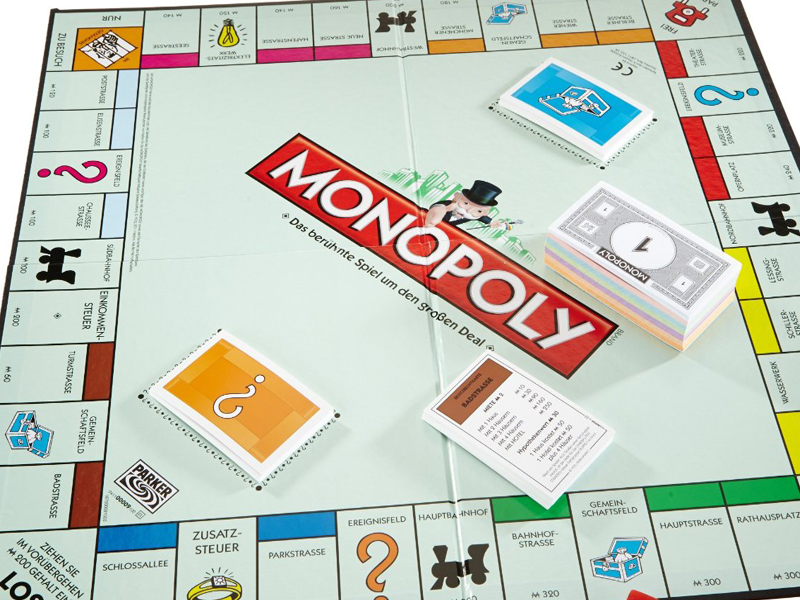Monopoly (Part 1)
Players: 2-4
Ages: 6 and up
Purchase: Buy on Amazon (affiliate link)
Math Ideas: Addition, Decomposing, Subitizing
Questions to Ask:
What do you hope to roll? Why?
What numbers are easiest to roll? What numbers are hardest?
As I type this, my son is playing Monopoly with his closest friend. I'm elated for two reasons. First, he's doing a ton of mathematical thinking right now. And more importantly, I don't have to play.
Maybe you've wondered why it's taken me over a year to write about the most famous board game of all time. Honestly, it's because Monopoly just isn't my favorite game. The first 20 minutes or so are fun, as you collect properties and try to negotiate trades with your opponents.
But after that, a sense of dread sets in as you realize that one player lucked into a much better set of properties than the others, and it's just a matter of time before they win. But when I say time, I mean time. Games can last two hours, and usually the person on the bad end of a bankruptcy feels pretty miserable for the last hour or so, as they barely pull their way out of poverty, only to slide back down due to a bad roll of the dice.
(It's almost like the creator of the game was making a point about capitalism!)
But my son loves the game, and his love of the game has made me re-evaluate Monopoly and think of ways to keep the fun and the math, while removing a bit of the grind. In next week's newsletter, I'll spend the whole time talking about the role of the banker. This week, I'll focus on the dice, the board, and the proper way to play Monopoly.
How to Play
Why am I even writing this section? I mean, you already know how to play Monopoly, obviously!
Or do you?
Ok, pop quiz. You land on Boardwalk. Congratulations! But wait, you don't have the $400 necessary to purchase it. So... better luck next time? Move on to the next players turn?
No! What you do instead is put the property up for auction! Start the bidding at $10 and let every player, yourself included, bid on Boardwalk until one player names a price that nobody else wants to match.
This rule, which is almost entirely ignored by most players, helps the game in two ways: First of all, the game goes quicker. If your opponent lands on a property you want, you might just be able to get it, provided they choose not to shell out the cash for the listed price.
Also, you could even land on a property, send it to auction, and buy it yourself for lower than the listed price! Maybe you can get Boardwalk for $320 if nobody else feels like outbidding you.
Also, auctions make the game so much more dynamic and add many more decision points to the early stage of the game. Otherwise, you're just at the mercy of the dice, hoping to magically roll a 3 and land on the property that happens to complete your monopoly.
Anyway, play how you want to play. Put income tax in the middle of the board and give it to whoever lands on Free Parking (also not a real rule!) But it might be worth giving the auction version a shot!
Where's the Math?
We'll get to the money later. This time, I want to talk about all the other math in Monopoly.
My son, who insists that we play with the money in the center, is basically playing the whole Monopoly game just for a chance to land on Free Parking. Once, he was sitting in the jail space (just visiting) and rolling for his move. As he rolled, he yelled out "Ten!" The dice rolled a four and a five. Without counting, he sighed and moved his battleship to the space just before Free Parking, boring old New York Avenue.
I told him "Don't worry, maybe you'll roll a one on our next turn."
"That's impossible, Dad..."
Ok, so let's take a step back and analyze all the math that just happened here!
First of all, he's played enough board games to know his dice sums by heart. This simply comes from repeated play. When he was three, he'd count all the pips on the dice. By age four, he was counting on his fingers. Now he's six and just knows that four and five make nine.
As always, one of the best parts of mathematical games is the way that it embeds this sort of practice into a fun context, so kids happily practice their sums over and over.
Secondly, the structure of the Monopoly board is based on ten. The important corner spaces, such as Go, Jail, and Free Parking, are each ten spaces away from each other. Not only that, but the four railroads are also ten spaces from each other and set in the middle, five away from each corner.
My son started using that fact in his movement around the board. If his first roll was a seven, he'd move straight to the first railroad, then go two more spaces. He was doing the opposite of adding: decomposing his sum into two pieces that were quicker for him to work with.
Lastly, he knows that certain combinations of dice simply can't occur. He knows he can't roll a 1, or a 13, or anything higher than that. Next in our journey, I want to see if he knows that some sums are easier to roll than others...
Questions to Ask
Monopoly is a great game for the classic question: "What do you hope to roll?" This gets kids thinking strategically about where their ideal properties lie. They count the spaces, roll their dice, and see how the sum compares. If they were hoping for a seven but rolled a nine, maybe they hop straight to their ideal property, then move forward twice. By getting your child to think ahead of her roll, you'll get her to see the structure of the board more quickly.
Since I mentioned this in the earlier section, you could ask your child "What dice rolls are hardest to get? Which are easiest?" Not all sums are created equally, and this can lead you into a nice diversion (as though you needed to make this game any longer).
The easiest way to talk about probability with dice is by using colored dice, as I did in my Sum Dice and Product Dice posts. You can check those out for more dice game ideas, just in case you're on your third hour of Monopoly and want to convince your kids to play something else.
Lastly, ask your kid "Want to try this weird version of the game where we auction the properties?" If you pitch it as a strange new way to play, rather than The Real Way, your kids might be more amenable to giving it a try!
Click here to buy Monopoly on Amazon (affiliate link)







